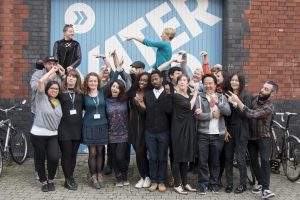
After 3 fantastic years Creative Producers International has come to an end. It has been a huge privilege to lead these 15 brilliantly talented practitioners on this phenomenal journey and I wanted to take this opportunity to share some final thoughts as the Producer of Producers.
The nature of producing isn’t linear. It is dynamic and messy and responsive, which is both the challenge and the beauty of the job. So that’s what this blog will be too – a collection of thoughts and observations inspired by guiding and observing a cohort of powerhouse Producers working together to achieve some incredible creative things in cities across the world.
Almost three years ago, when I sat down to write the open call for applicants to CPI, I realised that even with Watershed’s brilliant work in celebrating and advocating for Creative Producers over the years it was still really hard to define what this term meant. How do you describe a role that can mean so many things at once? And how did I know that what I thought of as a Creative Producer here in the UK would translate to other places I had never been to? Turns out I didn’t, and that was a good thing.
Defining the term has been an ongoing conversation throughout this programme. Having the opportunity to talk about it with a cohort of practitioners from different places who have wildly different careers, skillsets and perspectives has been enlightening. And the answer? Well, to be honest there isn’t one. Depending on the type of work they do, and where they do it, the Creative Producer looks very different. There are certainly qualities they have in common – they take risks, they build bridges, they connect people, they nurture, collaborate and support others to create and innovate, they have the vision and skills to manage projects, solve problems and curate experiences. The bottom line is, if the title of Creative Producer is useful, use it! And this programme has taught us that it is often useful. Very few of the cohort started this journey confident in using this term – in many of our participant cities like Durban and Tokyo it isn’t used or recognised at all. At the end of this journey, many of the cohort – and me too – now proudly call themselves Creative Producers and continue to share this language with friends, colleagues and collaborators across the world. For others, as Paula le Dieu described in my favourite quote of the whole programme, the lesson is this: “I don’t care what you call me, just don’t tell me I can’t f*cking do it.”
Watershed have long advocated for creating diverse cultural ecosystems – bringing different types of people together to collaborate, interrogate, experiment and innovate. CPI was ultimately an experiment designed to explore whether this approach would work for Producers – a role that traditionally serves these ecosystems as the facilitators of connectivity between others. When I started this job, I was really excited by this idea and I was fascinated to see what would happen. What I didn’t expect was how utterly transformational this experiment would be for all of us involved.
The power and potential of bringing these people together was made very clear during our two residential labs in Bristol and Tokyo. The labs gave the cohort the opportunity, space and time to step back from the front line and come together to talk about their passions and fears, triumphs and mistakes, to celebrate and challenge each other and to share their insights. The impact of this surprised us all. The labs became a safe space for respectful and vital interrogation. We asked difficult questions, challenged assumptions, and checked our privilege. We laughed about mistakes, we realised that it was okay to make them and that beautiful accidents can happen if you are brave enough to jump in and explore your weird ideas. We were awestruck and humbled by producing war stories from across the world. We learned about new forms of innovation and excitedly thought about how they could be adapted for our different contexts. Above all, we learned the value of seeing our work, and the world, through a different lens. It has helped all of us to expand our thinking – and our work will forever be better as a result.
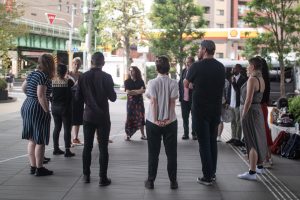
As a facilitator, the labs taught me some valuable lessons:
- Sharing knowledge and skills is brilliant, but people also need time and space to absorb and reflect. Don’t over-programme. Let people breathe.
- Make room for discussion. When people are given the chance to talk and debate the most amazing moments can happen.
- Play is universal and vital. When you play, you connect. Inhibitions are lowered, stress is alleviated, and creativity is encouraged.
- Know you don’t know it all and that is more than okay. Don’t be afraid to learn, respond and change the plan as you go. The plan will be better for it. Listen to what is happening, what feels important, roll with it.
- It’s okay to get it wrong. Try something. But recognise when that something doesn’t work and try something else.
- Duty of care is really important, especially when people are away from home.
Prioritising these things has made me a better practitioner. I will take them with me and apply them to everything I do from here on out.
By far the most challenging moment as the Producer of this programme was the delivery of the lab in Tokyo. It was an incredibly exciting prospect to work in a city so renowned for innovation and we had an amazing partner in British Council Japan, who helped us to design and deliver a complex event from the other side of the world. I felt a huge responsibility to replicate the safe, supported and open environment of our first lab in Bristol, and ensure that my duty of care to our guests (the cohort, our fabulous programme partners and guest speakers) helped them to feel grounded and to navigate working in a city that for the majority was very different to their own. What I didn’t prepare myself for was how different and difficult it would be holding the space of this lab so far away from home. I didn’t realise how much my familiarity with Bristol, being based at Watershed surrounded by colleagues and friends and sleeping in my own bed every night had helped sustain me during the delivery of our first lab. Tokyo was an amazing experience, and one of the highlights of the programme for sure, but next time I’ll make sure to check in with myself a little more and extend some of that duty of care in my own direction too.
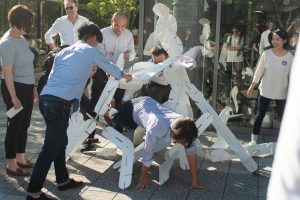
This provides a seamless segue into my next observation: my leadership of CPI has taught me that I am utterly rubbish at self-care. But it has also taught me that I am not alone in this as a Creative Producer. It was a common thread that fulfilling the role of the Producer – one which often involves holding and prioritising the needs of other people and working long hours racing towards deadlines – is pretty much universally exhausting no matter where you are doing it. It provided some comfort to know we weren’t alone in this, but that doesn’t make the burn out any less real when it creeps in. Talking openly about this issue taught us that, especially for Producers, we each have the responsibility to know and set our limits and personal needs and do our best to respond to them. Working longer hours doesn’t necessarily mean the work is better. Quite the opposite. Easier said than done, I know, but realising this is the first step to getting better at looking after yourself.
The major theme of CPI was city change – the programme called for practitioners who wanted to become change-makers in their cities. While this sounds very grand, we realised that a creative project, no matter how innovative, is unlikely to provide a solution to a problem. But that doesn’t mean they are without agency. We wanted to work with people who were passionate about using their talents to make a difference in the world, people who had the ambition to become cultural leaders in their cities and lead by example – and we found those people in this cohort. Our hope was that the programme could inspire the creation of work that would start new conversations with citizens around important issues and demonstrate the potential of art and culture to make our cities healthier and happier places to live.
Understandably, for the majority of the cohort the concept of change on a city-wide scale was intimidating; it was challenging to envisage their potential and imposter syndrome was prevalent. We encouraged them each to reflect on their cities and the issues that made them angry, frustrated and ignited their passion. The power of the network came into its own in the interrogation and refinement of their ideas. It provided an environment of championship that replaced imposter syndrome with a motivation to challenge the status quo. The interpretation of city change, and the strategies developed to address it, were distinctly different according to the specificities of person and context. In some cases, the Creative Producer identified a specific social issue, whilst some cities faced more insidious challenges. And some of the Producers recognised the need to invest time and resource in themselves in order to feel able to make a difference.
At Watershed we believe in keeping practice-based research and development at the heart of the creative process. Learning through making allows ideas to flow, important questions to be raised and solutions to be found. Thinking through doing also solidifies collaborations, encouraging an active pooling of resources to achieve a mutually desired outcome. Through CPI we gave the Creative Producers an opportunity to activate their learning and develop their ideas for city change in a live context, responding to specific local city challenges. The resulting projects were delivered through a range of creative forms and provided interesting insight into the specificities of context and the scales of change that were possible. In some places the work engaged collaborators and audiences from across the city. In other cities the work was localised and focussed on concentrated engagement with a more specific target audience. You can read about the projects we supported here.
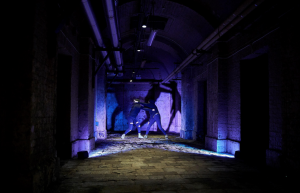
I really like this quote from artist Olafur Eliasson, “Art does not show people what to do, yet engaging with a good work of art can connect you to your senses, body, and mind. It can make the world felt. And this felt feeling may spur thinking, engagement, and even action.” I see a lot of this in the work that has come out of CPI. The Creative Producers created compelling prototypes that inspired people to stop and think, to connect with each other and the built environment – shared experiences that encouraged questions and conversations. These projects demonstrate that simple interventions can make places more liveable, hopeful and collaborative. They provided our participants with valuable evaluative evidence to make a case for continued investment in creative practice in their cities.
CPI has taught me a lot about working in other places and completely transformed my notion of what it means to do this. Touring work and experiencing creativity from other places is important and can be incredibly inspiring for the touring artists and the cities that showcase their work. But it’s important to think about legacy too. Working with the cohort in their contexts has taught me to question what it means for a UK organisation to tour work to different places, and how creative practice can evolve to ensure we create work that has lasting impact. It has demonstrated the value of amplifying local knowledge and skills and building a collaborative and sustainable environment for creative practitioners to come together to explore, experiment and innovate.
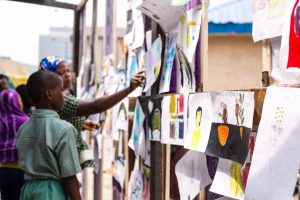
At times, my oddly meta role as the Producer of other Producers could be challenging. The cohort are a spirited bunch (I say this with love and as a very good thing), and by nature of their profession very used to confidently taking the lead in their work with a very clear conviction. I was also acutely aware of my position as a white, cis, British man working for a UK-based organisation helping inspire and support work being created in places I had never been to. The Creative Producers knew their contexts and I needed to take their lead. It was important that the participants had complete autonomy over their own work. Realising when to contribute, and when to fight my Producer’s instincts to get involved was a process that took time. Sometimes we butted heads (just a little bit), sometimes I got it wrong and sometimes my objectivity helped them out. I hope more often the latter. I’ve learned a great deal about when to listen and when to challenge. I’ve learned the value of having clearly defined roles and responsibilities on creative projects. And I’ve learned how integral it is to maintain open and honest communication when working collaboratively.
The thing I am most proud of is the connectivity this programme has inspired among a group of people who were complete strangers two years ago. It is the most human thing in the world to want to find your tribe – people who can sustain you and give you the energy you need to succeed. But producing can often feel like a lonely profession. CPI has given this cohort their tribe – a network of support and celebration that helps them to be courageous, think bigger and aim higher. Every one of the Creative Producers has undergone a huge amount of personal and professional development during our time together – some have begun exciting new jobs, some have realised they can work alongside organisations and still be activists with a defined set of core values and some have become true thought leaders in their fields. Best of all, they thank each other for it.
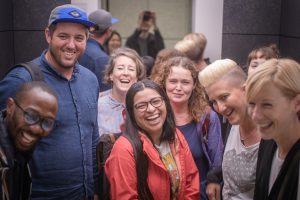
A few months ago, I asked the cohort (somewhat nervously) to create a plan for their network moving forwards, if they wished it to continue. The results were more than I could have hoped for. Together they co-authored a manifesto for their engagement involving quarterly digital meetings, a fundraising strategy (equitable across the cohort) for a physical event in three years’ time and a CPI book of critical essays reflecting on their journey to pass on the legacy to other Creative Producers. The network has become a living, breathing, thing of its own, strong enough to adapt, thrive and grow beyond the end of the programme. And that is really exciting.
Together with our research team from UWE Bristol, we are creating a project report for the programme, which will be published in early 2020. This report is aimed at a global audience and will be useful for a wide range of readers – those who might identify as Creative Producers, who are curious and passionate about connecting and building creative networks; cultural organisations who are inspired to support and work with Creative Producers; or those working in non-creative industries interested in connecting with the cultural economy in their cities. It will feature stories, reflections, and critical thinking about the work of creative producing in an international context. And it will share our CPI methodology and include actionable tools for readers to share, copy, edit or clone for use in their own practice.
I think of change and impact as long form things – their effects take time to be fully realised. And this is the case with Creative Producers International. The impact of this programme will grow and evolve over the coming years. But I think it has started something special. So, I don’t know yet how this programme has been good for the world, but I am really looking forward to finding out.
